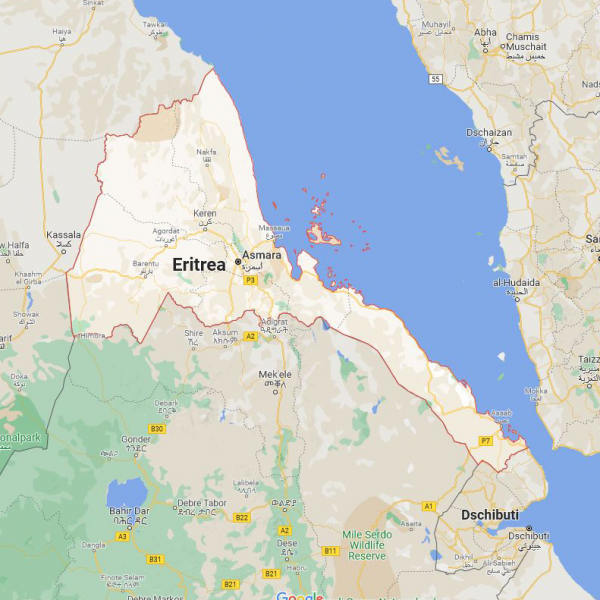
About Eritrea
- Eritrea, a small country located by the Red Sea, is one of the world’s poorest and most isolated nations.
- It is nearly 3 times the size of Switzerland, but is less densely populated, with an estimated population of 5.1 million.
- The East Africa Rift valley shapes the landscape, and divides the country into fertile highlands, and arid coastal plains.
- It is marked by a difficult and sometimes violent relationship with its southern neighbour Ethiopia. After the Peace Agreement with Ethiopia in 2018, the country was full of hope for reforms and more freedom and prosperity.
- With the arrival of COVID-19 the borders of Eritrea were closed, and a lockdown was imposed, causing severe food insecurity.

0 +
Only 1 doctor is available per 2,000 Eritreans (estimation)
0 +
Less than 60% of women receive antenatal care
0 +
Almost 500 mothers die per 100,000 births
Our partner in Eritrea
Unfortunately, Due to the current situation, we are not able to support projects in Eritrea at the moment!
- Our partner for all projects in Eritrea is the German Association ARCHEMED. Based on their longstanding experience and network in Eritrea and the cooperation with medical specialists, they have a big impact on improving access to quality health care for children in Eritrea.
- We have been supporting specific projects in Eritrea since 2012 with a focus on realising the right to health. The activities were located in different parts of the country, such as in the capital city Asmara, in Keren (around 90km northwest of Asmara), and in Barentu (capital of the western region Gash Barka).





Our Focus in Eritrea
Health
- We focus our engagement on improving the access to quality health care services. Since 2012, we have supported different initiatives of our partner ARCHEMED in various medical disciplines, notably ophthalmology, neonatology, and antenatal care.
- We support ARCHEMED in regularly sending volunteer medical professionals on missions to Eritrea, to treat patients, especially difficult cases, but also to train the local doctors, nurses, and hospital staff.
- These trainings empower the local health care professionals to improve the quality of health care services. In turn, the local population now trusts the hospital staff and people are going for medical assistance, which is especially crucial for pregnant women.








Projects in Eritrea
Together we make it happen
Keep up to date with our exciting activities
